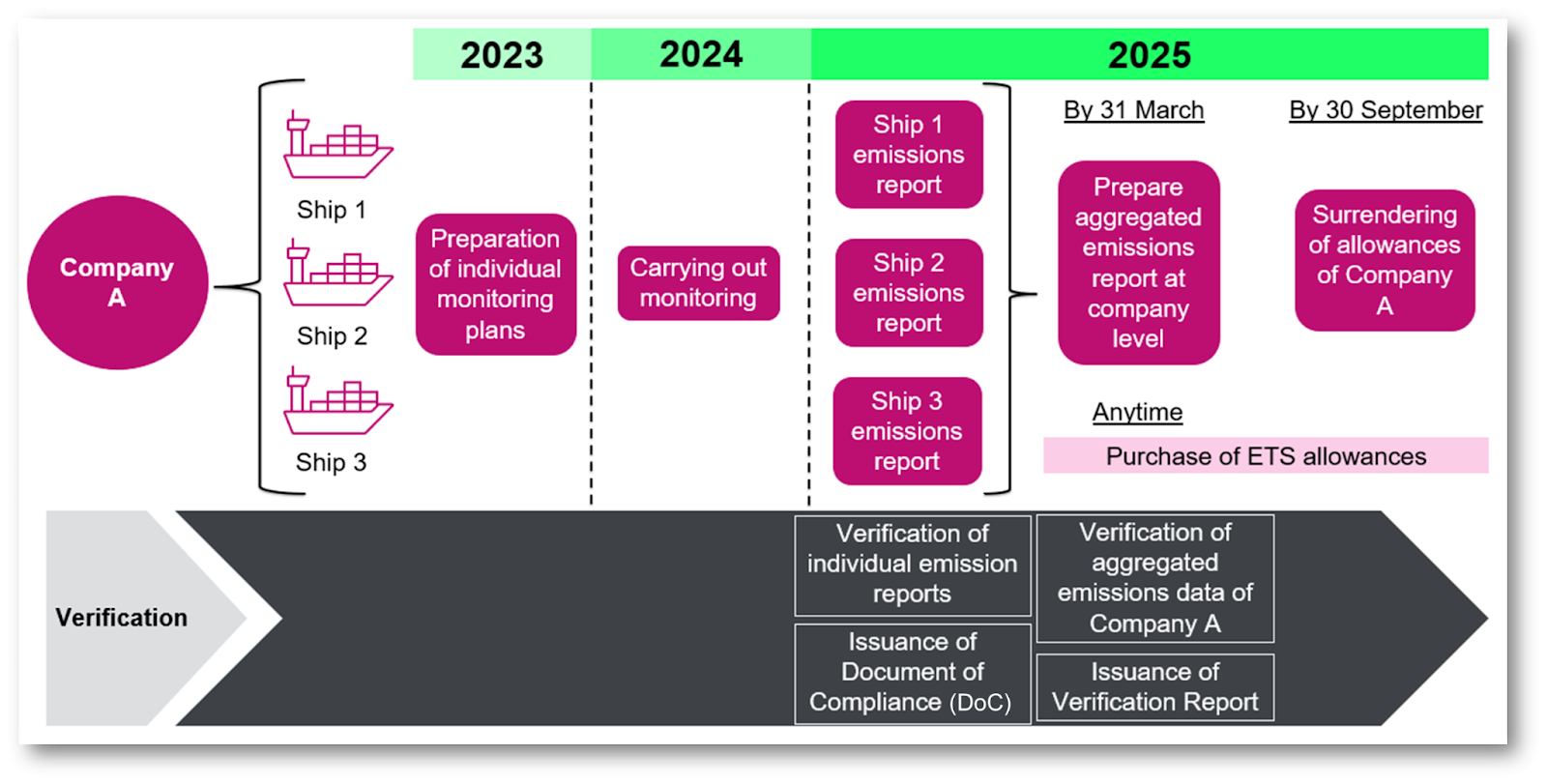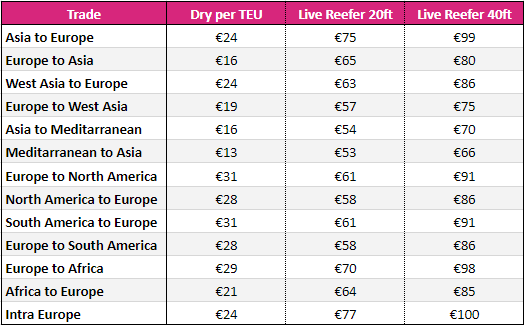Trilha de navegação
European Union Emissions Trading System (“EU ETS”) with effect from January 1st, 2024
EU ETS
Effective from January 1st, 2024
In recent years, there has been a concern on climate change throughout the industries and Ocean Network Express, as a global shipping company, shall support and fully comply with the latest requirement to reduce greenhouse gas (GHG) emission in order to seek a sustainable and environmentally-friendly world.
Below shows what has been the global approach for GHG emission reduction by the European Union (EU), how EU ETS relates to this green approach, and, ultimately, how it impacts our customers.
<Background of Green Approach>
Recent movement towards GHG emission reduction in the maritime sector has gained traction as the International Maritime Organization (IMO) adopted a strategy of GHG emission reduction, “MEPC 80”. Accordingly, the EU set a goal of reducing GHG emissions by at least 55% by 2030 compared to the 1990 levels and also set a target of net zero emissions by 2050 in the long run. In July 2021, a comprehensive climate policy package, “Fit for 55” was announced in an effort to achieve the 2030 target, including a proposal to extend the EU Emissions Trading System (EU ETS) to the shipping sector.
<Overview of EU ETS>
The EU ETS was launched in 2005 to reduce GHG emissions in the EU. This is an emission cap-and-trade system that aims to reduce GHG emissions in the EU area by setting a limit on GHG emissions for certain sectors of the economy. A revision of the EU ETS directive has been extended to include shipping from 1st January 2024, and applies to cargo and passenger ships above 5000 GT from 2024 and offshore ships above 5000 GT from 2027.
Below shows the notable rules of this EU ETS.
-Phase-in approach-
The applicable range of EU ETS is to be expanded year by year. Gradual introduction of accounting emissions from 2024 are as follows:
-
Emissions in 2024 (surrendered in 2025): 40% of the total emissions in the scope
-
Emissions in 2025 (surrendered in 2026): 70% of the total emissions in the scope
-
Emissions from 2026 onwards: 100% of the total emissions in the scope
* From 2026, CH4 (methane) and N2O (nitrous oxide) will be included in emissions accounting.
-Geographical scope-
The applicable range of EU ETS differs depending on the calling ports of each service we provide and transshipment port protection measures are applied to neighboring non-EU ports within 300 nm of an EU port, if container handling at that port is >65% transshipped.
Emissions in the geographical scope of the EU ETS for shipping are as follows:
- 50% of CO2 emissions from voyages between an EU/EEA port and a non-EU/EEA port
- 100% of CO2 emissions from voyages between the EU/EEA ports
- 100% of CO2 emissions while at berth in EU/EEA ports
-Compliance Cycle-
Companies are required to monitor, report and verify the GHG emissions on an annual basis and this information will be used to determine the European Union Allowances* (hereinafter refer to as “EUA”) they need to surrender within a compliance period, or they will be penalized.
As a result of the implementation of EU ETS starting from January 1st, 2024, there may be an increase expected in the overall shipping cost, and Ocean Network Express is to purchase such EUA based on the CO2 emission amount throughout 2024 and pass them to the respective vessel/ship owners so that they can appropriately surrender EUA to the EU by September 30th of the next calendar year.
Below chart shows how the compliance cycle of EUA surrender works for your reference.

*European Union Allowances (EUA) that are equivalent to the annual CO2 emissions should be obtained for surrender. Each allowance gives the holder the right to emit one tonne of carbon dioxide (CO2) or one tonne of carbon dioxide equivalent
<Impact to Our Customers>
In order to fully comply with the latest requirement set by the EU and in accordance with the additional cost of such compliance, ONE will be implementing an “ETS” surcharge, for which we would like to seek your kind understanding and cooperation in order to collectively achieve a sustainable and environmentally-friendly world.
Below table shows ONE’s high-level surcharge tariff assumption in case 40% of the reporting CO2 will be charged. The below figures are based on estimation and are subject to change. The actualized surcharge tariff will be announced separately prior to the actual implementation.
In terms of the tariff calculation, the tariff will be refreshed every quarter and we will be referring to the December Future Price of the EUA price tracker sourced by ICE as one of the benchmarks.
<Surcharge Tariff Assumption>

(Base Assumptions for above)
- 40% of the CO2 emission needs to be purchased to comply with EU ETS as a full implementation stage.
- 100% of CO2 emitted between EU ports/ 50% of CO2 emitted between EU ports and non-EU port sailing will be charged.
- Based on current available data/information and service structures as of October 2023.
- Based on the assumption to implement the same charge to all EU area related cargoes.
Should you have any questions, please do not hesitate to contact your ONE representative.
Yours faithfully,
Ocean Network Express Pte. Ltd.
For cargo to/from Europe/Mediterranean:
Latest Basic Ocean Freight rates, Bunker Related Charges, THCs (origin or destination), Security Related charges, Peak Season Surcharges (if applicable) can be accessible at our website:
https://eua.one-line.com/standard-page/europe-fak-ocean-tariff
https://ecomm.one-line.com/ecom/CUP_HOM_3116.do
https://eua.one-line.com/standard-page/eua-local-surcharges
Other charges such as local charges and contingency charges may apply.